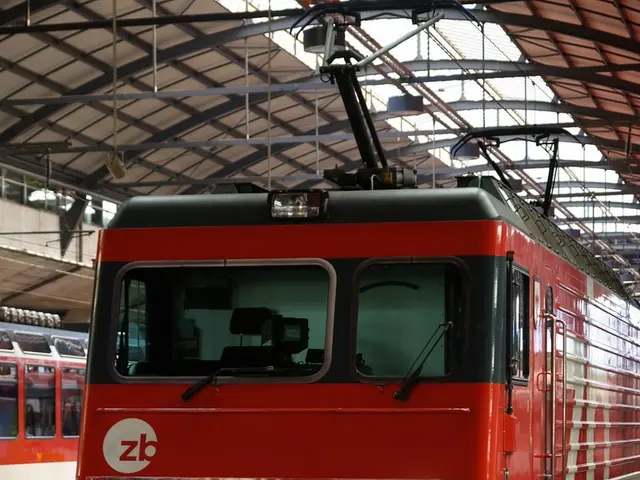BVG secures rights for new facility construction in Adlershof
A Long Overdue Upgrade
It's been a bloody long haul, mate. Four bloody years and four months to be precise. Finally, the Berlin Transport Authority (BVG) has nabbed the construction rights for a brand new tram depot in Adlershof. Last Saturday, they bloody well bloody published the plan approval decision, issued two weeks earlier.
This new baby is gonna house up to 60 of the current tram cars and an additional 10 in the workshop halls. That's right, we're talking about the current vehicles that can stretch up to a whopping 40 meters. But this bad boy's been built to accommodate trams up to 60 meters long, like those blooming Urbanliner types, which are nearly 52 meters long and set to start rolling on the M4 line this very year.
Adlershof ain't gonna be left behind in the eco-game. Power's gonna come from sources that don't harm Mother Earth, like geothermal, waste heat, or solar thermal power. Rainwater? It ain't gonna end up in the sewer system. Instead, it'll be collected with green roofs and a cistern and either infiltrate or evaporate. The trams are gonna move automatically on the depot's track network without a driver.
BVG's CEO, Henrik Falk, was chuffed as a clam about the new digs. He said, "The great strength of this new building lies in its adaptability. We can swiftly and confidently respond to new requirements—whether through renovations or expansions. The open design provides the necessary flexibility for the future. This depot is a role model for the expansion of our infrastructure."
Back in early 2020, they were still eyeing a 2022 commissioning date. But the plan approval process didn't kick off until 2021. The depot's now expected to come to life in 2030, according to the BVG. After the plan approval decision, they'll dive into the nitty-gritty of planning for parking facilities, tracks, switches, and underground structures. Construction's slated to begin in 2026.
It's a bloody replacement for the existing depots in Oberschöneweide and Köpenick, which can't be tweaked for the current Flexity-type vehicles due to a few reasons, like heritage protection and their bloomin' width of 2.40 meters.
The construction site on the former coal yard ain't without its issues. The dirt and groundwater are polluted from over a hundred years of industrial use. And since the area was a bomb target during World War II, they had to bloody well bloody search for and remove unexploded ordnance first. They'll need to raise the site by 1.50 meters before they can bloody well build the halls and tracks.
The last reported cost for the construction's a cool 120 million euros. The site'll be linked via two tracks branching off from the existing Adlershof turnaround loop. The area runs parallel to the railway, heading out of the city almost to Köpenicker Straße.
Initially, a site near the S-Bahnhof Johannisthal on the Groß-Berliner Damm was also on the cards for the depot. That would've been more operationally favorable as the site could've been connected to the tram track network from two sides and would've been a walk in the park for BVG staff to reach. But that plan was bloody well scrapped due to expected greater difficulties in acquiring the land and the risk of nearby properties losing value.
For a smooth connection of the soon-to-be-created depot at Adlershof station, the expansion of the tram line in Dörpfeldstraße is still missing. It's currently a single-track with crossovers, lacking the bloody well needed capacity for numerous operational trips, especially in the mornings and evenings when many trains are in operation or returning to the depot.
The planning approval procedure for the double-track expansion in Dörpfeldstraße was initiated in 2020. But due to long-standing disputes over the future division of the limited road space, the public display wasn't made until bloody well bloody summer 2024. "With the submission of these planning approval documents, the BVG is solely aiming for the expansion of the double-track in Dörpfeldstraße in the year 2026," it is stated in the application.
Given the bloody well experiences even with seemingly simple projects in Berlin, it seems at least very optimistic that construction rights should be granted as early as bloody next year. After all, the pure track construction formally has nothing to do with the planned redesign of the road space.
In the context of the proposed upgrade in Berlin's public transit system, the finance industry may need to provide funding for the construction of the new tram depot in Adlershof, which is set to accommodate long urban transit vehicles like the Urbanliner. The new depot, set to be operational in 2030, will also incorporate eco-friendly technologies such as geothermal, solar thermal, and rainwater collection systems. Moreover, the finance sector might be involved in the expansion of the tram line in Dörpfeldstraße, which is currently a single-track and needs to be upgraded to a double-track to improve operational capacity, especially during peak hours. The planning approval procedure for this expansion was initiated in 2020, but it is anticipated to face long-standing disputes over the division of road space, potentially pushing back the construction process.








